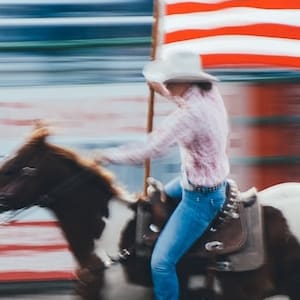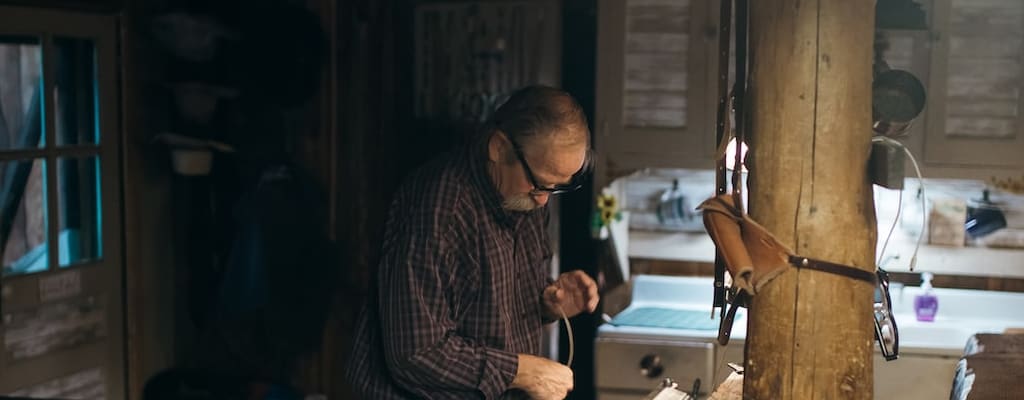saddle tramp: Idiom Meaning and Origin
What does ‘saddle tramp’ mean?
The idiom "saddle tramp" refers to a person, often a cowboy, who leads a nomadic and independent life, moving from place to place and finding work where it is available without a permanent home or stable job.

Idiom Explorer
The idiom "sawdust trail" refers to the path followed by a person during a religious revival or evangelistic campaign. It signifies the emotional and spiritual journey taken by individuals who are deeply involved in such religious activities.
The idiom "rough trot" refers to a difficult or challenging period of time or situation. It conveys the idea of facing hardships or experiencing a series of problems.
The idiom "rough sledding" means to undergo a difficult or challenging time or situation.
The idiom "road less traveled" means choosing an unconventional path or taking a less popular route, often in life or decision-making, different from the majority or mainstream choices.
The idiom "ride the wave" means to go along with or take advantage of a favorable situation or trend. It implies adapting to the circumstances and enjoying the success or benefits that come from it.
"Ride the rails" is an idiom that means to travel by train, often used specifically to refer to the experience of being a hobo and illegally hopping on trains to get from place to place.
The idiom "ride tall in the saddle" means to display confidence, authority, and control in a situation. It is often used to describe someone who is self-assured and in a position of power.
The idiom "ride out" means to endure or survive a difficult situation or problem without giving up or being greatly affected by it.
The idiom "ride one's luck" means to depend on chance or luck, often in a risky or daring situation, rather than on one's own skills or abilities. It suggests taking advantage of favorable circumstances without having much control over the outcome.
The idiom "ride off into the sunset" means to have a happy or satisfying ending or departure, often in a romantic or idealized way.
The Mystical Journey
The idiom "saddle tramp" is a colloquial expression that originated in the United States. It refers to a person who travels on horseback and has no fixed home or occupation. This idiom is primarily used to describe a nomadic lifestyle often associated with cowboys and the American West.
One of the key elements of this idiom is the word "saddle," which refers to the seat on a horse's back. The word "tramp" in the idiom is an informal term that means to travel on foot or by other means, often with no particular destination in mind.
Historically, cowboys played a significant role in shaping the meaning and usage of the idiom "saddle tramp." These cowboys, also known as cowhands or cowpokes, were skilled riders who herded cattle across vast distances in search of grazing land and markets. As they traveled from place to place, often spending long periods in the saddle, they came to embody the image of the saddle tramp.
The idiom "saddle tramp" captures the freedom and independence associated with a wanderer's life. It suggests a sense of adventure and a rejection of conventional societal norms. It conjures images of wide-open spaces, dusty trails, and the romanticized cowboy lifestyle. While the idiom may have originated in the context of the American West, it has since become a cultural symbol that transcends geographical boundaries.
Today, the idiom is often used figuratively to describe someone who leads a transient or unconventional lifestyle, whether by choice or circumstance. It may refer to individuals who move from place to place, pursuing their passions or seeking new experiences. The term "saddle tramp" can also be employed in a more negative sense, to denote someone who is idle, aimless, or unreliable.
The idiom "saddle tramp" encapsulates a unique aspect of American culture and history. It embodies the spirit of exploration, self-reliance, and the pursuit of freedom. Its usage may have evolved over time, but its core meaning remains rooted in the idea of a person unbound by the constraints of a settled life. It showcases the rich tapestry of idiomatic expressions that reflect the diverse and ever-changing nature of our language.
To further explore the relationship between "saddle tramp" and other idioms, let's take a look at how this idiom is related to "on the trot," "ride the rails," "rough trot," and "one-horse town."
The idiom "on the trot" is often used to describe a person who is constantly moving or busy. It shares a similar theme of movement and transience with "saddle tramp." Both idioms convey a sense of restlessness and a disregard for settling down in one place.
"Ride the rails" is another idiom that relates to "saddle tramp." It refers to traveling by train, particularly in an illegal or unconventional manner. Just like a saddle tramp rides a horse, someone who rides the rails is constantly on the move and seeking new experiences.
"Rough trot" is an idiomatic expression that signifies a difficult or challenging period. It can be used to describe a tough phase in someone's life or a challenging time for a group or organization. This idiom is related to "saddle tramp" in the sense that both convey a sense of adversity and struggle.
Lastly, "one-horse town" is an idiom that describes a small, insignificant place with little to offer. This idiom can be contrasted with the image of wide-open spaces and the freedom associated with a saddle tramp's life. While a saddle tramp roams freely, a one-horse town represents a limited and uneventful existence.
Example usage
Examples of how the idiom "saddle tramp" can be used in a sentence:
- She loved the freedom of the open road, living like a saddle tramp, with no permanent address.
- The cowboy rode into town, a rugged saddle tramp with a weathered face and dusty boots.
- After losing his job, he embraced his wanderlust and became a nomadic saddle tramp, traveling from town to town.
The idiom "saddle tramp" is often used to refer to individuals who live a nomadic or transient lifestyle, often on horseback or with minimal belongings. It can be used to describe someone who enjoys the freedom of the open road, with no permanent address or responsibilities. The term "saddle tramp" is typically associated with cowboys and the Old West, evoking images of ruggedness and adventure.
More "Travel" idioms



